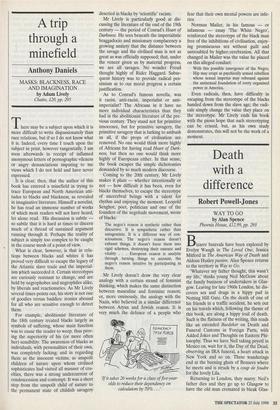A trip through a minefield
Anthony Daniels
MASKS: BLACKNESS, RACE AND IMAGINATION by Adam Lively Chatto, £20, pp. 295 There may be a subject upon which it is more difficult to write dispassionately than race relations, but if so I do not know what it is. Indeed, every time I touch upon the subject in print, however tangentially, I am soon afterwards in receipt of inflamed anonymous letters of pornographic vileness or angry denunciations imputing to me views which I do not hold and have never expressed.
It is clear, then, that the author of this book has entered a minefield in trying to trace European and North American atti- tudes to blacks and blackness, as revealed in imaginative literature. Himself a novelist, he has read an immense number of works of which most readers will not have heard, let alone read. His discussion is subtle — so subtle that it is hard at times to discern much of a thread of sustained argument running through it. Perhaps the reality of subject is simply too complex to be caught in the coarse mesh of a point of view.
What is clear, however, is that in rela- tions between blacks and whites it has proved very difficult to escape the legacy of the Atlantic slave trade and the imperial- ism which succeeded it. Certain stereotypes are curiously resistant to change, and are held by negrophobes and negrophiles alike, by liberals and reactionaries. As Mr Lively several times points out, his story is not one of goodies versus baddies: ironies abound for all who are sensitive enough to detect them.
For example, abolitionist literature of the 18th century treated blacks largely as symbols of suffering, whose main function was to cause the reader to weep, thus prov- ing the superiority of his (or more often her) sensibility. The awareness of blacks as individuals, with personalities of their own, was completely lacking; and in regarding them as the innocent victims, as unspoilt children of nature upon whom civilised sophisticates had visited all manner of cru- elties, there was a strong undercurrent of condescension and contempt. It was a short step from the unspoilt child of nature to the permanent state of childish savagery descried in blacks by 'scientific' racists.
Mr Lively is particularly good at dis- cussing the literature of the end of the 19th century — the period of Conrad's Heart of Darkness. He sees beneath the imperialistic braggadocio and missionary complacency a growing anxiety that the distance between the savage and the civilised man is not as great as was officially supposed; that, under the veneer given us by material progress, we are all savages. No wonder Freud thought highly of Rider Haggard. Subse- quent history was to provide radical pes- simism as to our moral progress a certain justification.
As to Conrad's famous novella, was it racist, anti-racist, imperialist or anti- imperialist? The Africans in it have no more individual characteristics than they had in the abolitionist literature of the pre- vious century. They stand not for primitive innocence, but for primitive savagery, the primitive savagery that is lurking to ambush us all, if the props of civilisation are removed. No one would think more highly of Africans for having read Heart of Dark- ness, but then no one would think more highly of Europeans either. In that sense, the book escapes the simple dichotomies demanded by so much modern discourse.
Coming to the 20th century, Mr Lively makes it plain — whether intentionally or not — how difficult it has been, even for blacks themselves, to escape the stereotype of uncerebral beings with a talent for rhythm and enjoying the moment. Leopold Senghor, poet, politician and one of the founders of the negritude movement, wrote of blacks:
The negro's reason is synthetic rather than discursive. It is sympathetic rather than antagonistic. It is a different way of con- sciousness. The negro's reason doesn't exhaust things, it doesn't force them into rigid schemes, destroying their essence and vitality . . . European reason is analytic through turning things to account, the negro's reason intuitive by participating in them.
Mr Lively doesn't draw the very clear analogy with a certain strand of feminist thinking, which makes the same distinction between masculine and feminine reason; or, more ominously, the analogy with the Nazis, who believed in a similar difference between Aryan and Jewish reason. It is very much the defence of a people who 'If it takes 26 weeks for a class of five-year- olds to reduce their dependency on calculators by 70% . . fear that their own mental powers are infe- rior.
Norman Mailer, in his famous — or infamous — essay 'The White Negro', reinforced the stereotype of the black man free of the inhibitions of civilisation, enjoy- ing promiscuous sex without guilt and untroubled by higher;cerebration. All that changed in Mailer was the value he placed on this alleged conduct:
With this possible emergence of the Negro, Hip may erupt as psychically armed rebellion whose sexual impetus may rebound against the antisexual foundation of every organised power in America.
Even radicals, then, have difficulty in escaping from the stereotype of the blacks handed down from the slave age; the radi- cals simply change the value they place on the stereotype. Mr Lively ends his book with the pious hope that such stereotyping can be erased, but, as his own study demonstrates, this will not be the work of a moment.


























































 Previous page
Previous page